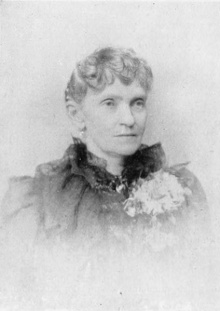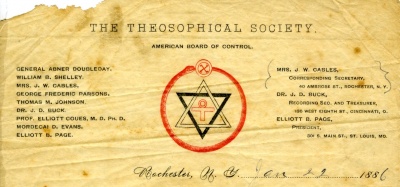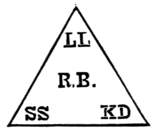Josephine Cables: Difference between revisions
No edit summary |
No edit summary |
||
| Line 10: | Line 10: | ||
Her second husband, '''William F. Aldrich''' joined the Gnostic Lodge of Washington, D.C. on October 15, 1885.<ref>Theosophical Society General Membership Register, 1875-1942 at [http://tsmembers.org/ http://tsmembers.org/]. See book 1, entry 3465 (website file: 1B/15).</ref> He married Josephine Cables on April 16, 1889.<ref>Joel Campbell, DuBose. [https://books.google.com/books?id=9CXMvfjLgEoC&pg=PA437 ''Notable Men of Alabama: Personal and Genealogical''] Southern Historical Association, 1904 .</ref> They adopted two children: Farrington (1889-1908) and Josephine. | Her second husband, '''William F. Aldrich''' joined the Gnostic Lodge of Washington, D.C. on October 15, 1885.<ref>Theosophical Society General Membership Register, 1875-1942 at [http://tsmembers.org/ http://tsmembers.org/]. See book 1, entry 3465 (website file: 1B/15).</ref> He married Josephine Cables on April 16, 1889.<ref>Joel Campbell, DuBose. [https://books.google.com/books?id=9CXMvfjLgEoC&pg=PA437 ''Notable Men of Alabama: Personal and Genealogical''] Southern Historical Association, 1904 .</ref> They adopted two children: Farrington (1889-1908) and Josephine. | ||
Mr. Aldrich was elected as a Republican to the fourth congressional district of Alabama. The election was hotly contested election "based on alleged intimidation an racial prejudices growing out of appeals for white supremacy", and was ultimately decided by a House committee.<ref>"To Seat Aldrich" ''Montgomery Enterprise'' January, 1900.</ref><ref>"Robbins Bounced" ''Wide Awake'' [Birmingham, AL] January 24, 1900.</ref> In 1912 he became an owner and editor of the ''Birmingham Times''. "His career as an editor was full of action. He advocated in politics democracy as against autocracy."<ref>''A History of | Mr. Aldrich was elected as a Republican to the fourth congressional district of Alabama. The election was hotly contested election "based on alleged intimidation an racial prejudices growing out of appeals for white supremacy", and was ultimately decided by a House committee.<ref>"To Seat Aldrich" ''Montgomery Enterprise'' January, 1900.</ref><ref>"Robbins Bounced" ''Wide Awake'' [Birmingham, AL] January 24, 1900.</ref> In 1912 he became an owner and editor of the ''Birmingham Times''. "His career as an editor was full of action. He advocated in politics democracy as against autocracy."<ref>George M. Cruikshank, ''A History of Birmingham and Its Environs, a Narrative'' (Chicago: Lewis Publishing), 164.</ref> | ||
Josephine died on [[August 12]], 1917. | Josephine died on [[August 12]], 1917. | ||
| Line 60: | Line 60: | ||
</blockquote> | </blockquote> | ||
According to a biographical sketch in ''A Woman of the Century'', she was serving in 1893 as "vice-president of the Woman's National Industrial League, vice-president of the Woman's National Liberal Union, and was one of the founders of the Woman's National University and School of Useful and Ornamental Arts."<ref>Frances E. Willard and Mary A. Livermore, Editors. "Josephine Cables Aldrich" ''A Woman of the Century'' (New York: Charles Wells Moulton, 1893), 16.</ref> | According to a biographical sketch in ''A Woman of the Century'', she was serving in 1893 as "vice-president of the Woman's National Industrial League, vice-president of the Woman's National Liberal Union, and was one of the founders of the Woman's National University and School of Useful and Ornamental Arts."<ref>Frances E. Willard and Mary A. Livermore, Editors. "Josephine Cables Aldrich" ''A Woman of the Century'' (New York: Charles Wells Moulton, 1893), 16.</ref> | ||
'''The Woman's National Liberal Union''' (WNLU) was founded by [[Matilda Joslyn Gage]], whom Josephine knew from the Rochester Branch, and "reflected in particular Gage’s belief that the established churches were a major bulwark of male supremacist teaching, a view she expanded on in her book Woman, Church, and State (1893)."<ref>"Matilda Joslyn Gage" in [https://www.britannica.com/biography/Matilda-Joslyn-Gage#ref215772 Encyclopedia Britannica].</ref> The '''Woman's National Industrial League''' was a union of female federal clerks that later joined the Knights of Labor. | |||
== Writings == | == Writings == | ||
Revision as of 20:32, 16 November 2021
UNDER CONSTRUCTION
UNDER CONSTRUCTION
Josephine Cables Aldrich was one of the most influential American members of the Theosophical Society in its early days as a cofounder of the first American Theosophical lodge, Rochester Theosophical Society, in New York state in 1882. In 1886 she established the twelfth lodge, Gita Theosophical Society, in Aldrich, Alabama. She was an author, editor of The Occult Word, and philanthropist.
Personal life
Josephine Warner married James Harvey Cables.
Her second husband, William F. Aldrich joined the Gnostic Lodge of Washington, D.C. on October 15, 1885.[1] He married Josephine Cables on April 16, 1889.[2] They adopted two children: Farrington (1889-1908) and Josephine.
Mr. Aldrich was elected as a Republican to the fourth congressional district of Alabama. The election was hotly contested election "based on alleged intimidation an racial prejudices growing out of appeals for white supremacy", and was ultimately decided by a House committee.[3][4] In 1912 he became an owner and editor of the Birmingham Times. "His career as an editor was full of action. He advocated in politics democracy as against autocracy."[5]
Josephine died on August 12, 1917.
Theosophical Society activities
Rochester Theosophical Society
On July 27, 1882, Mrs. Cables became a co-founder of the Rochester Branch, which was the first lodge established in the United States. She, her husband James, and fourteen others from Rochester joined the membership rolls of the Theosophical Society on that day.[6] The first issue of William Quan Judge's periodical The Path said of Rochester, "This is the elder brother in America."[7] William B. Shelly served as president, and Mrs. Cables was secretary.[8] For several years before the lodge was formed, Mr. Shelly and Mrs. Cables had gathered with a group of friends to study "problems presented to thinking minds in life and death."[9]
The lodge grew to at least 25 members, including Matilda Joslyn Gage, a remarkable feminist and mother-in-law of L. Frank Baum. She was admitted to the Rochester Theosophical Society on March 26, 1885.[10][11] Another member who joined on Jun 11, 1884 was George C. Bragdon, father of Claude Bragdon.[12] The Bragdon family was prominent in several Rochester lodges, including Genesee, White Lotus, and Iris, and established the Manas Press. William Quan Judge reported:
The Rochester Branch seems to us to be, in this country at least, the vital centre of Theosophy. No members are admitted to that branch unless in the opinion and knowledge of its officers they are worthy and striving diligently to make themselves more worthy by pure lives and kind actions, pure thoughts and worthy deeds.
We are especially impressed with the beauty of character and the wonderful working capacity of Mrs. J. W. Cables, the secretary. She seems gifted with a remarkable penetration amounting to prescience, enabling her to read the minds and history of all with whom she comes in contact and to tell them what they are to expect, and what they may be able to accomplish in the future by their own labors if they will. She was the first of all Theosophists at Rochester and has now gathered a faithful company of co-workers about her to the number of about forty. She could have many more members if she were at all indifferent as to the character of all those who offer themselves. But she prefers purity to the fictitious strength to be realised from mere increase of number. We did not see Mr. Shelley the worthy and venerable President of the Branch as he was absent from home. The Society is sorely persecuted and tried by its enemies – The enemies of Theosophy. But probably not more so than other branches. The beauty of all this is that they make a perfect triumph at every point of attack. In all these labors Mrs. Cables is the moving and diving spirit knowing just what to do and how to do it. And under her leadership it is inspiring and beautiful to see how kindly and harmonious they all work together.[13]
American Board of Control
The American Board of Control was constituted on May 13, 1884 by "Special Order" of President-Founder Henry Olcott, then in India, to establish central management of the American branches of the Theosophical Society. Mrs. Cables was took on the role of corresponding secretary; Elliott B. Page of St. Louis was President; and Dr. J. D. Buck served as recording secretary and treasurer. Other Board members were Abner Doubleday, William B. Shelley, George Frederic Parsons, Thomas Moore Johnson, and Mordecai D. Evans. Professor Elliott Coues was also a member for a time.
The Board of Control held a convention in July, at Rochester, N. Y., when various matters relating to admission of members and other details of organization were discussed. In accordance with a resolution passed on June 6th by the Executive Council, Adyar, the Board was then dissolved.[14]
Theosophical Society in Aldrich, Alabama
Mrs. Cables established the Gita Theosophical Society in the small coal-mining town of Aldrich, Alabama, in 1886 as the twelfth American branch of the Theosophical Society. It was never large, and dissolved on September 29, 1887.[15]
Rochester Brotherhood
During her residence in Alabama, Mrs. Cables kept contact with friends in Rochester. On November 3, 1887, she organized the Rochester Brotherhood, an esoteric society dedicated to the study of the Christian Scriptures and the teachings of Theosophy.
Hermetic Brotherhood of Luxor
Other activities
Mrs. Aldrich assisted her husband in his plan to institute a system of public defenders for people accused of crimes.
They believe the administration of justice is very one sided in civilized countries. They are inclined to think, in brief, that free government in this country means a government of rich men, by rich men for rich men, the poo, the women, the children, Indians and other unfortunates not being people at all in the popular sense of the word.
Mr. and Mrs. Aldrich declare that especially in a law trial a poor person without friends is almost certain to be convicted whether guilty or not, under the present administration of justice, or injustice, as they incline to think it often is. Judge, jury and state's attorney are paid by the state, and are all on the side of wealth and power.
For this reason the philanthropic pair propose to be two out of twenty who shall give $5,000 each as a fund to secure the appointment of public defenders, lawyers of brilliant powers and established reputation, to conduct the defense of accused persons who are too poor to secure the services of able lawyers for themselves. Ultimately, when laws can be passed to that effect, these public defenders, as the promoters of the plan hope, will be employed by the state and paid by the state, as the prosecuting attorney now is.[16]
According to a biographical sketch in A Woman of the Century, she was serving in 1893 as "vice-president of the Woman's National Industrial League, vice-president of the Woman's National Liberal Union, and was one of the founders of the Woman's National University and School of Useful and Ornamental Arts."[17]
The Woman's National Liberal Union (WNLU) was founded by Matilda Joslyn Gage, whom Josephine knew from the Rochester Branch, and "reflected in particular Gage’s belief that the established churches were a major bulwark of male supremacist teaching, a view she expanded on in her book Woman, Church, and State (1893)."[18] The Woman's National Industrial League was a union of female federal clerks that later joined the Knights of Labor.
Writings
The Union Index of Theosophical Periodicals lists six articles by or about Mrs. Cables. The contents of her journal The Occult Word are not included in the index; issues are quite rare.
Mrs. Cables conducted a large correspondence with such people as William Quan Judge, Damodar K. Mavalankar, and Thomas Moore Johnson.
Notes
- ↑ Theosophical Society General Membership Register, 1875-1942 at http://tsmembers.org/. See book 1, entry 3465 (website file: 1B/15).
- ↑ Joel Campbell, DuBose. Notable Men of Alabama: Personal and Genealogical Southern Historical Association, 1904 .
- ↑ "To Seat Aldrich" Montgomery Enterprise January, 1900.
- ↑ "Robbins Bounced" Wide Awake [Birmingham, AL] January 24, 1900.
- ↑ George M. Cruikshank, A History of Birmingham and Its Environs, a Narrative (Chicago: Lewis Publishing), 164.
- ↑ Theosophical Society General Membership Register, 1875-1942 at http://tsmembers.org/. See book 1, entries 1285-1299 (website file: 1A/42).
- ↑ "Theosophical Activities" The Path 1.1 (April, 1886), 30.
- ↑ A. E. S. Smythe, "Editorial Notes" The Lamp 4.6 no. 42 (August, 1900), 181.
- ↑ "Theosophical Activities" The Path 1.1 (April, 1886), 30.
- ↑ Theosophical Society General Membership Register, 1875-1942 at http://tsmembers.org/. See book 1, entry 3274 (website file: 1B/11).
- ↑ See A Notable Theosophist: L. Frank Baum by John Algeo.
- ↑ Theosophical Society General Membership Register, 1875-1942 at http://tsmembers.org/. See book 1, entry 3048 (website file: 1B/6) for George Bragdon.
- ↑ "The Rochester Theosophical Society" The Theosophist Supplement Vol. 6 (December, 1885), 162.
- ↑ A. J. Cooper-Oakley, "NAME OF ARTICLE," General Report of the TS or Theosophist??? (January, 1887), ???.
- ↑ The Theosophist (April, 1888).
- ↑ "Public Defenders" Chillicothe Morning Constitution May 11, 1890. Also printed in The News of Frederick MD on May 6, Newark Daily Advocate on May 6, and other newspapers.
- ↑ Frances E. Willard and Mary A. Livermore, Editors. "Josephine Cables Aldrich" A Woman of the Century (New York: Charles Wells Moulton, 1893), 16.
- ↑ "Matilda Joslyn Gage" in Encyclopedia Britannica.


